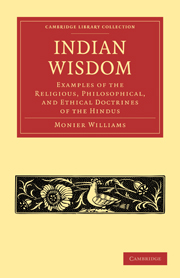Book contents
- Frontmatter
- PREFACE
- THE INDO-ROMANIC ALPHABET WITH THE EQUIVALENT SANSKṚIT LETTERS AND RULES FOR PRONUNCIATION
- Contents
- INTRODUCTION
- LECTURE I The Hymns of the Veda
- LECTURE II The Brāhmana Portion of the Veda
- LECTURE III The Systems of Philosophy
- LECTURE IV The Nyāya System of Philosophy
- LECTURE V The Sānkhya System of Philosophy
- LECTURE VI The Mimāṉsā System of Philosophy
- LECTURE VII Irregular Systems and Eclectic School
- LECTURE VIII Smṛiti. The Vedāngas
- LECTURE IX Smārta-sūtra. Gṛihya, ‘domestic rules’
- LECTURE X The Law-books. Mainu continued
- LECTURE XI Metrical Version of some of Manu's Moral and Religious Precepts
- LECTURE XII The Epic Poems
- LECTURE XIII The Mahā-bhārata
- LECTURE XIV The Epic Poems compared together and with Homer
- LECTURE XV The Artificial Poems
- INDEX
- ADDITIONS AND CORRECTIONS
- ORIENTAL WORKS
LECTURE XV - The Artificial Poems
Published online by Cambridge University Press: 29 August 2010
- Frontmatter
- PREFACE
- THE INDO-ROMANIC ALPHABET WITH THE EQUIVALENT SANSKṚIT LETTERS AND RULES FOR PRONUNCIATION
- Contents
- INTRODUCTION
- LECTURE I The Hymns of the Veda
- LECTURE II The Brāhmana Portion of the Veda
- LECTURE III The Systems of Philosophy
- LECTURE IV The Nyāya System of Philosophy
- LECTURE V The Sānkhya System of Philosophy
- LECTURE VI The Mimāṉsā System of Philosophy
- LECTURE VII Irregular Systems and Eclectic School
- LECTURE VIII Smṛiti. The Vedāngas
- LECTURE IX Smārta-sūtra. Gṛihya, ‘domestic rules’
- LECTURE X The Law-books. Mainu continued
- LECTURE XI Metrical Version of some of Manu's Moral and Religious Precepts
- LECTURE XII The Epic Poems
- LECTURE XIII The Mahā-bhārata
- LECTURE XIV The Epic Poems compared together and with Homer
- LECTURE XV The Artificial Poems
- INDEX
- ADDITIONS AND CORRECTIONS
- ORIENTAL WORKS
Summary
I CAN only notice very briefly the remaining classes of Indian writings which follow on the Rāmāyaṇa and Mahā-bhārata. In their religious bearing, as constituting part of Smṛiti, and as chiefly drawn from the two great Epics, the eighteen Purāṇas possess the next claim on our attention. It will be convenient, however, to introduce here an enumeration of some of the more celebrated artificial poems and dramas, which are connected with the Epics, adding a few explanations and examples, but reserving the fuller consideration of these and other departments of Sanskṛit literature to a future opportunity.
The Artificial Poems.
Some of the best known of the artificial poems are:
The Raghu-vaṉśa or ‘history of Raghu's race,’ in nineteen chapters, by Kālidāsa, on the same subject as the Rāmāyaṇa, viz. the history of Rāma-ćandra, but beginning with a longer account of his ancestors; 2. the Kumāra-sambhava, by Kālidāsa, on the ‘birth of Kumāra’ or Kārttikeya, god of war, son of S'iva and Pārvatī,—originally in sixteen cantos, of which only seven are usually edited, though nine more have been printed in the Pandit at Benares; 3. the Megha-dūta, ‘cloud-messenger,’ also by Kālidāsa—a poem of 116 verses, in the Mandākrāntā metre (well edited by Professor Johnson), describing a message sent by a banished Yaksha to his wife in the Himālayas; a cloud being personified and converted into the messenger; 4. the Kirātārjunīya, ‘battle of the Kirāta and Arjuna,’ by Bhāravi, in eighteen cantos, on a subject taken from the fourth chapter of Mahā-bhārata III, viz. the penance performed by Arjuna, one of the Pāṇḍava princes, and his combat with S'iva disguised as a Kirāta or wild mountaineer (see p. 393); […]
- Type
- Chapter
- Information
- Indian WisdomExamples of the Religious, Philosophical, and Ethical Doctrines of the Hindus, pp. 449 - 518Publisher: Cambridge University PressPrint publication year: 2010

